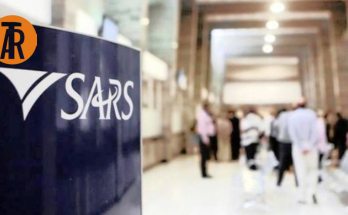South Africa’s tax system faces a critical challenge as a small percentage of taxpayers continue to bear the burden of the country’s revenue collection.
Recent data from the National Treasury reveals that just 3.94% of taxpayers contribute nearly half of all personal income tax (PIT), raising concerns about the sustainability of the nation’s fiscal framework.
Heavy Reliance on a Narrow Tax Base
Efficient Group Chief Economist Dawie Roodt has expressed concerns over the government’s increasing dependence on a small group of high-income earners.
He warns that any further tax burden placed on this group could lead to unintended consequences, including a potential collapse of revenue collection efforts.
According to the latest figures, PIT remains the government’s primary revenue source, expected to generate R811.1 billion in the upcoming financial year.
This is followed by value-added tax (VAT) at R499.5 billion and corporate income tax (CIT) at R331.3 billion. These revenues fund essential public services such as infrastructure, education, healthcare, and social grants.
Nigeria Grants Tax Relief on Healthcare Raw Materials to Lower Costs
Growing Number of High Earners, But Still Too Few
In the 2025/26 financial year, 569,351 South Africans earning over R1 million annually contributed to PIT. This marks a 16% increase from the 490,676 high-income earners recorded in the previous year.
However, despite this rise, these individuals account for less than 4% of the total 14.45 million registered taxpayers yet contribute almost half of PIT revenue.
Economists caution that relying so heavily on such a small group creates a fragile tax system. “The fact that such a small number of individuals contribute so much is a warning sign,” Roodt stated. “If this group feels overburdened, they may seek alternative ways to reduce their tax liabilities, including relocating their wealth abroad.”
Tax Bracket Freeze Sparks Concern
Originally, the National Treasury had planned minor adjustments to tax brackets in its February budget. However, the revised budget omitted these changes, meaning taxpayers will face bracket creep, effectively paying more tax as inflation pushes their earnings into higher tax brackets.
Roodt argues that this decision is problematic. “Not adjusting tax tables is bad news. It places an increasing burden on the same set of taxpayers, making the tax system less sustainable in the long run.”
Revenue Targets May Be Overestimated
While the government expects these tax measures to generate an additional R28 billion in 2025/26 and R14.5 billion in 2026/27, Roodt believes these projections are overly optimistic.
He suggests that South Africa has surpassed the optimal point on the Laffer Curve, where increasing tax rates further could actually reduce overall revenue.
“The economy is not expanding at a rate that supports higher tax collection,” he explained. “Employment growth is stagnant, and additional taxation risks discouraging economic participation.”
The VAT Increase: An Overestimated Impact?
In addition to personal income tax concerns, the government anticipates collecting R13.5 billion from a 0.5% VAT increase. However, Roodt predicts that the real figure will be closer to R10 billion, as demand-side economic pressures may suppress consumer spending.
“The government has overestimated the secondary effects of demand. Households are already struggling with inflation and high debt levels, meaning they may cut back on spending rather than absorb higher VAT costs,” he noted.
Capital Flight and Wealth Relocation
Roodt also highlighted a growing trend among South Africa’s high-net-worth individuals—shifting their assets abroad to escape rising taxation.
“My work with wealthy clients shows a clear pattern: they feel overtaxed and are moving their money out of South Africa,” he revealed. “Many of them work in industries that allow remote operations, making it easier for them to relocate to more tax-friendly jurisdictions.”
If personal income tax rates increase further, more high earners could restructure their tax affairs to reduce their local obligations. This could exacerbate South Africa’s revenue challenges, creating further economic instability.
The Risk of Pushing Too Far
Experts caution that further tax hikes could backfire, leading to declining revenues rather than increased collections. “If the government continues down this path, tax compliance could erode, and future revenues will come under significant pressure,” Roodt warned.
South Africa’s tax authorities face a difficult balancing act—ensuring sufficient revenue generation while avoiding policies that drive taxpayers away. Without a broader tax base and meaningful economic growth, the country’s reliance on a shrinking pool of high earners could threaten long-term fiscal stability.




